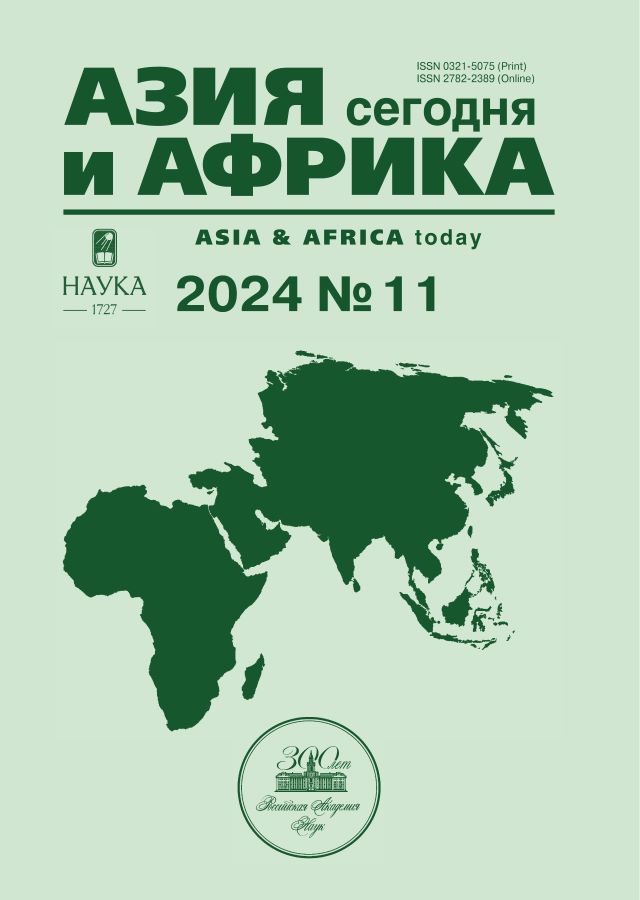Modern Perception of Water Scarcity Issue in African Countries
- Авторлар: Berezhnov A.I.1
-
Мекемелер:
- Institute for African Studies, Russian Academy of Sciences
- Шығарылым: № 11 (2024)
- Беттер: 40-48
- Бөлім: Politics, economics
- URL: https://jdigitaldiagnostics.com/0321-5075/article/view/647476
- DOI: https://doi.org/10.31857/S0321507524110051
- ID: 647476
Дәйексөз келтіру
Аннотация
The article analyzes how water scarcity on the African continent is perceived by the United Nations, Russia, and African countries. Water is an important part of the UN Sustainable Development Agenda. The international decade for action on Water for Sustainable Development was declared from 2018 to 2028. The author studies the United Nations’ vision of the water issue by using 2 indicators that often appear in reports of this international organization and its subordinate structures, namely access to water supply services and the level of water stress. These parameters are compared with the results of public opinion polls conducted by the African research center “Afrobarometer” and search query statistics in Google Trends. In order to identify Russian society’s ideas on the water issue in Africa, literary works, as well as publications of the TASS news agency were analyzed.
Негізгі сөздер
Авторлар туралы
Andrei Berezhnov
Institute for African Studies, Russian Academy of Sciences
Email: a.i.berezhnov@inafr.ru
ORCID iD: 0000-0001-8329-0549
Junior Researcher, Centre for Global and Strategic Studies Moscow, Russian Federation
Әдебиет тізімі
- Данилов-Данильян В.И. Глобальная проблема дефицита пресной воды. Век глобализации. 2008. № 1, с. 45-56.
- Pearce F. 2012. On Safe Drinking Water, Skepticism Over UN Claims. Yale Environment 360. https://e360.yale.edu/features/on_safe_drinking_water_skepticism_over_un_claims (accessed 29.08.2024)
- Naik P.K. 2016. Water crisis in Africa: myth or reality? International Journal of Water Resources Development. Vol. 33. № 2. Pp. 326-339. https://doi.org/10.1080/07900627.2016
- Satterthwaite D. 2016. Missing the Millennium Development Goal Targets for Water and Sanitation in Urban Areas. Environment and Urbanization. Vol. 28. № 1. Pp. 99-118. https://doi.org/10.1177/0956247816628435
- Liu K. 2024. The Measurement Errors of Google Trends Data. Discov Data. № 2:7. Pp. 1-11. https://doi.org/10.1007/s44248-024-00013-3
- Quist-Adade C. 2005. From Paternalism to Ethnocentrism: Images of Africa in Gorbachev’s Russia. Race & Class. Vol. 46. № 4. Pp. 79-89. https://doi.org/10.1177/030639680504600406
- Уманская Ж.В. Образ Африки и африканцев в российской и советской детской иллюстрации. География искусства: новые ракурсы. М.: ГИТР, 2020. С. 152-175. ISBN 978-5-94237-073-2
- Квак Х.М. Образ Африки в сказках К.И.Чуковского. Вестник ВЭГУ. № 2 (58). 2012. С. 127-131.
- Shershukova N., Pogrebnyak Y., Vaganova D. 2021. Image of Africa in the Linguistic Worldview of Modern Russian People. Proceedings of the 2nd International Conference on Language, Communication and Culture Studies. Pp. 8691. https://doi.org/10.2991/assehr.k.211025.014
- Виноградова С.М., Мбайрам Т.Н. Образ Африки в российском медийном дискурсе: между толерантностью и ксенофобией. Вестник Санкт-Петербургского университета. 2008. Серия 6. № 1. С. 65-77.
- Евгеньева Т.В. «Неведомая земля»: образ Африки в сознании современных россиян. Гуманитарные науки. Вестник Финансового университета. 2020. № 10 (3). С. 15-19. doi: 10.26794/2226-7867-2020-10-3-15-19
- Попова Е.А., Шурупова О.С. Образ Африки в русской лингвокультуре. Новый филологический вестник. 2022. № 4 (63). С. 357-367. doi: 10.54770/20729316-2022-4-357
Қосымша файлдар









